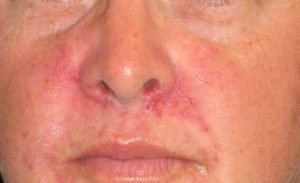

What is eczema? Can you have eczema on the nose? How is it treated or what remedies can help reduce the various symptoms that come with this skin condition?
Eczema is a skin condition that commonly affects skin creases as well as other body parts. It is common in areas such as the back of the knees, around the neck, front of the elbow as well as the wrist.
However, it can also affect other areas including around the mouth and nose area, on cheeks, buttocks, behind the ears, on hands or even feet.

Why triggers it?
Note that there are several types of eczema which include xerotic, dyshidrotic, stasis, lichen simplex chronicus, nummular, allergic contact dermatitis and seborrheic.
This condition is also known as atopic dermatitis since this kind is the most prevalent. Although common in children, it also occurs in adults. It is considered chronic since it can affect you for many years. It may disappear but will come again after a while.
Atopic dermatitis makes the skin turn red and severely itchy. The redness and itching are witnessed in the affected regions. So far, medics have not discovered any cure for eczema. However, people can take drugs and apply ointments that provide temporary relief to the condition.
According to Mayo Clinic, eczema manifests in the following symptoms:
These are general symptoms. When on the nose, it takes the same symptoms. It may even be more severe given these body parts are quite essential as far as breathing is concerned.
Unlike eczema in other body parts that targets children, this one targets adults, especially between 30 and 60 years. In some cases, it may target young ones less than 3 months of age.
It is believed that nose eczema comes in the form of seborrheic dermatitis, a type of eczema. This type targets body parts that have numerous oil glands. Some of these areas include:
According to the National Eczema Association, the real cause of this condition is unknown. Sometimes, it is associated with changing hormones and genes. In other instances, it is associated with bacterial and fungal attacks. Nevertheless, it remains to be a chronic nose infection that no one wishes to have.
Although the cause is unknown, certain factors are known to trigger or worsen it. Medical News Today identifies that most of the triggers are environmental and lifestyle-related.
Some of these triggers include:
Any of these risk factors may trigger this condition or worsen an existing one. Identifying the trigger and minimizing contact may provide relief.
National Eczema Association notes that nose eczema is both age and gender-specific. In terms of age, it targets adults from 30 years of age and above. However, it may also occur in infants. In terms of gender, you are likely to find more men than women suffering from this condition.
It also targets the following groups of people:
If you are a victim of this condition, just check if you fall into any of the above groups. Dermatologists note that eczema on the nose is a secondary infection. It comes as a result of an underlying health issue. This is the main reason why it is quite hard to treat.
There are many infections that may target the nose. How do you differentiate between this condition and other infections?
In some cases, dryness, itching, and redness around the nose may not be eczema. According to livestrong.com, red itchy skin around the nose may be an irritation from cold temperatures. Our noses are unusually very sensitive. A common cold would also make it turn red and itchy.
Eczema around the nose, under the nose and inside the nose is easily identifiable. Its onset will change how the skin around this area looks like. Initially, the skin around the affected area becomes dry and flaky.
You may at times think that you are having dandruff on nose. The upper part of your nose seems to have greasy scales. If left untreated, it may spread to other parts of your face.
Commonly, you can identify eczema on the nose by identifying the following symptoms:
In most cases, all these symptoms appear together. This makes it easy to identify and conclude that it is eczema. Most of the above symptoms are noted outside the nose; the skin around the nose.
Once your doctor has concluded that it is eczema, you should now think about the available treatment options and remedies.
There is no specific treatment that can cure or treat nose eczema. The available options focus on reducing the severity of the condition. Most of these drugs focus on reducing itching, swelling, and inflammation.
Go for safe products
If you suffer from eczema on your nose or any other part of your body, you need to carefully consider the safety of the various products, including clothing and fabric, cleansers, gels, ointments, creams, wipes, moisturizers, cleansers, sunscreens as well as your haircare, household, and other OTC products.
Ensure they do not aggravate the condition further but helps in improving the skin irritation, redness, and other symptoms.
Oral and topical corticosteroid
Will help in reducing redness, inflammation, and itchiness. This will give your skin a chance to heal faster. Topical antifungal ointments and antifungal oral drugs in case of a fungal infection.
Home remedies will include
These drugs and remedies may not heal eczema on the nose but may provide palliative care.
Some lifestyle-related measures play a significant role in preventing it. Below are some practices that you can try to achieve this:
References